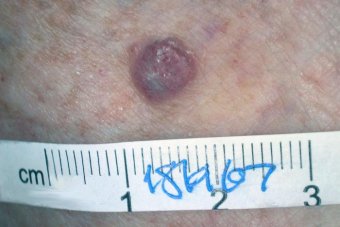A Brisbane scientist has discovered a new way of detecting the presence and early spread of melanoma disease, which could improve a patient’s chance of survival.
Mitchell Stark, from the QIMR Berghofer Medical Research Institute, has found a panel of seven biomarkers which can accurately monitor melanoma via blood tests.
“The blood test could indicate that there’s very early signs of progression, that you can’t see in a scan just yet,” he said.
“You need to monitor these patients a lot more closely than you once would.”
Eleven thousand Australians are diagnosed with melanoma each year and 1,500 of those die.
Research shows early detection is key to survival.
“If you do catch it in its early stages you have a greater than 92 per cent chance of it never coming back and you having a fantastic chance of survival,” Mr Stark said.
“However, if it’s allowed to spread to distal sites your prognosis isn’t as great.”
Emma Betts, 23, from Corinda had a mole removed from her shoulder in 2012.
It was very thin and she was told as long as she had three-monthly checkups she should be fine.
Then she found a lump under one arm and knew she was in trouble.
“I really kept on top of everything but unfortunately I was just the unlucky person that fell in that 5 per cent where that little cell just ran away from us,” Ms Betts said.
She was diagnosed with Stage IV melanoma, with scans confirming it had spread to most major organs. Within weeks the six months she had been given to live, quickly became three.
“At that point I knew it was terminal,” she said.
But Ms Betts is still here and has detailed her battle with the disease on her blog Dear Melanoma.
“It’s still terminal but I’m hoping for time,” she said.
If the blood test had been available sooner it could have made a difference for Ms Betts.
“Having the blood test, or the three-monthly skin checks, could have drastically changed it, in that it could have picked up that the melanoma would spread and we could have stopped it at an earlier stage instead of ending up as Stage IV,” she said.
Biomarkers able to detect melanoma in blood test
Mr Stark’s research, which was recently published, took specimens from 255 melanoma patients with various stages of the disease and 130 control patients.
It looked for elevated levels of the markers or microRNAs – tiny molecules which regulate the amount of protein a gene can produce.
Mr Stark said he found that in specimens from Stage IV patients, the new biomarkers confirmed tumour progression in 100 per cent of cases.
“These had the ability to detect the presence of melanoma in a blood test with high accuracy and sensitivity and specificity, and as it turned out, seemed to be superior to currently used methods of blood analysis for melanoma progression,” he said.
The findings would now be validated in a larger cohort of patients, expected to take two years.
Queensland Science and Innovation Minister Leeanne Enoch said the discovery would also help determine whether stressful and expensive CT scanning was necessary at each follow-up consultation.
“This research will make a huge difference to Queenslanders but the impact of this research will be seen right across the world,” she said.
Ms Betts urged Queenslanders to avoid the sun and have regular checkups.
“Mine was just bad luck but yours may not be bad luck,” she said.
She said her blog was helping her deal honestly with the disease and she hoped it was helping others.
“It’s just taking one day at a time,” she said.
“And kind of breaking down some of the barriers, the whole ‘live in the moment, stay positive’ [idea], because sometimes you don’t want to live in the moment or stay positive, you just want to have a big old cry.”



